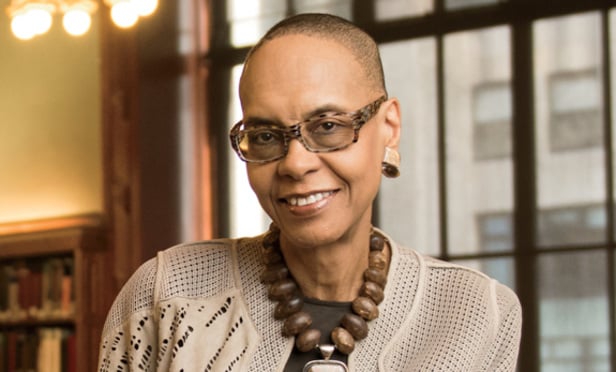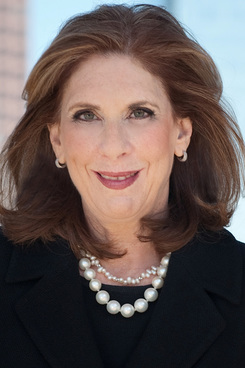A 'petri dish' for discrimination – why women end up leaving law firms
Male partners make 44% more than female counterparts, according to a recent report
November 08, 2016 at 04:10 AM
7 minute read
 Michele Coleman Mayes, chair of the American Bar Association's Commission on Women in the Profession
Michele Coleman Mayes, chair of the American Bar Association's Commission on Women in the Profession
When a female lawyer files a public complaint against her firm alleging gender discrimination, the firm's response tends to fit a standard model: a denial of any discrimination and a confirmation of the firm's commitment to advancing women lawyers.
Yet the lawsuits – and the claims of gender inequity at law firms that stay private – continue to arise.
"I'm not even suggesting that there's an outright conscious decision to treat someone in a discriminatory way," says Michele Coleman Mayes, chair of the American Bar Association's Commission on Women in the Profession. "It's wrapped up in many factors."
Those factors include assumptions about women and unconscious biases against them, which create an imbalance in the opportunities presented to women and men, advocates for gender pay equity say. Throughout the course of a career, those missed opportunities result in lower pay.
"The way law firm compensation systems are set up basically provides a petri dish for implicit bias," says Joan Williams, a professor at University of California, Hastings College of the Law.
Williams' sentiment is backed up by other law firm leaders, who blamed origination for findings in a recent report that showed male partners make 44% more than female partners.
Women are excluded from leadership roles and compensation committees, steered into certain practice areas, taken off cases or clients that require time away from parental responsibilities, and disadvantaged by subjective compensation criteria, observers say.
"It is surprising that this goes on, but it does," says Roberta Liebenberg, a former chair of the Commission on Women in the Profession. "It's a steady drip, drip, drip. This is ultimately why women end up leaving law firms."
 Lauren Stiller Rikleen (pictured), who authored Closing The Gap, a 2013 report presented by the American Bar Association's Presidential Task Force on Gender Equity and the Commission on Women in the Profession, says it is difficult to know whether progress is being made on gender pay equity in the legal industry because many firms are unwilling to share data.
Lauren Stiller Rikleen (pictured), who authored Closing The Gap, a 2013 report presented by the American Bar Association's Presidential Task Force on Gender Equity and the Commission on Women in the Profession, says it is difficult to know whether progress is being made on gender pay equity in the legal industry because many firms are unwilling to share data.
But the data that does exist, she says, shows little improvement through recent years. There has been little change in the number of women equity partners at law firms. She notes that more women are making it into the non-equity partner ranks, but without equity partnership they cannot achieve the same level of compensation and influence.
Getting the credit
Rikleen says the greatest impediment to pay equity is the traditional system of inheriting clients and allocating client credit.
"Most firms will say all the right things, and then say 'our women don't develop business the way men do'," says Rikleen, but often those male partners benefit from older male lawyers passing down clients.
That's rarely a conscious decision.
"We tend to mentor people who remind us of ourselves, so men have always benefited from these opportunities," Rikleen says. "If women are not part of that institutional inheritance of business in a firm, they are already at a significant disadvantage as rainmakers."
Maybe you don't want to just be an employment or family lawyer. But that's the signal people send: 'You belong here, little girl. Don't fight it'
Mayes says these biases are natural, so they have to be deliberately interrupted. This can begin to take shape at the associate level, she adds.
"If you look at who you've given work to, and it's only your white male or all male associates, you have to shake it up," Mayes says. "We're asking people to… figure out how they can measure things, because what matters is [what is] measured."
Liebenberg says women rarely get full credit for bringing in clients. Firms need to think about their succession policies and make sure women are in line for business succession, she says.
"When you talk about changing the practice of allowing senior lawyers to pass on client credit, that is hard work," Rikleen says. "That goes beyond saying: 'We have a women's initiative. We care about diversity.'"
Pregnancy problems and other assumptions
Mayes says many of the factors that create inequities at law firms do not involve conscious decisions, but are driven by assumptions or stereotypes. For instance, women are often steered into less lucrative practice areas.
"Women weren't seen as 'fit' to do certain things," Mayes says, but those areas – like M&A or cybersecurity – have become more lucrative for partners.
"Maybe you don't want to just be an employment lawyer, or family law," Mayes says. "But that's the signal people send: 'You belong here, little girl. Don't fight it.'"
This is particularly common for women who have children or plan to have children in the future, Mayes says. This is often referred to as 'maternal law', she adds.
Williams says women frequently report that they see their pay suffer when they return from maternity leave. Many firms do not pro-rate billings to account for the three months a new mother is away, she says, and it can affect a female lawyer's compensation for up to two years.
 "Being a mother is the most persistent, blatant bias in the workplace," Liebenberg says. "Associates who are stars before they have children, once they come back from maternity leave somehow they're found to be not as committed."
"Being a mother is the most persistent, blatant bias in the workplace," Liebenberg says. "Associates who are stars before they have children, once they come back from maternity leave somehow they're found to be not as committed."
Liebenberg says lawyers who are mothers may not be considered for a matter that requires long hours or travel. Male partners presume those women lawyers will not want to be away from their families, she says.
In addition, women are often seen as being good service partners, rather than rainmakers, Williams says. They're seen as good team players but they're denied the career-enhancing opportunities that men, who are seen as more competitive, enjoy.
Changing the landscape for women
Advocates for gender pay equity at law firms point to several ways in which firms can create a fairer environment.
Liebenberg points to one concrete improvement firms could make – getting more women on their compensation committees, and more than just a 'token' woman on the committee. She says there is a direct correlation between the number of women on a firm's compensation committee and how women are faring there.
Additionally, Liebenberg says, firms should develop more objective criteria for determining compensation levels.
Mayes says law firm leaders and others with decision-making power must be challenged to look at a broader audience when opportunities arise; while corporate counsel can also make diversity a priority when reviewing their external counsel.
"People are stuck in a rut. They look in the same place to fish every time, as if that's the only pond to find fish in," Mayes says.
Rikleen says unconscious bias training should be mandatory in all workplaces. And firms need to start thinking about and discussing these biases, so the burden does not fall entirely on female lawyers.
"We need to have these honest and open conversations that will make people uncomfortable," Rikleen says. "That's probably the single biggest barrier."
This content has been archived. It is available through our partners, LexisNexis® and Bloomberg Law.
To view this content, please continue to their sites.
Not a Lexis Subscriber?
Subscribe Now
Not a Bloomberg Law Subscriber?
Subscribe Now
NOT FOR REPRINT
© 2025 ALM Global, LLC, All Rights Reserved. Request academic re-use from www.copyright.com. All other uses, submit a request to [email protected]. For more information visit Asset & Logo Licensing.
You Might Like
View All
Will a Market Dominated by Small- to Mid-Cap Deals Give Rise to This Dark Horse US Firm in China?

Big Law Sidelined as Asian IPOs in New York Dominated by Small Cap Listings

X-odus: Why Germany’s Federal Court of Justice and Others Are Leaving X

Mexican Lawyers On Speed-Dial as Trump Floats ‘Day One’ Tariffs
Trending Stories
- 1No Two Wildfires Alike: Lawyers Take Different Legal Strategies in California
- 2Poop-Themed Dog Toy OK as Parody, but Still Tarnished Jack Daniel’s Brand, Court Says
- 3Meet the New President of NY's Association of Trial Court Jurists
- 4Lawyers' Phones Are Ringing: What Should Employers Do If ICE Raids Their Business?
- 5Freshfields Hires Ex-SEC Corporate Finance Director in Silicon Valley
Who Got The Work
J. Brugh Lower of Gibbons has entered an appearance for industrial equipment supplier Devco Corporation in a pending trademark infringement lawsuit. The suit, accusing the defendant of selling knock-off Graco products, was filed Dec. 18 in New Jersey District Court by Rivkin Radler on behalf of Graco Inc. and Graco Minnesota. The case, assigned to U.S. District Judge Zahid N. Quraishi, is 3:24-cv-11294, Graco Inc. et al v. Devco Corporation.
Who Got The Work
Rebecca Maller-Stein and Kent A. Yalowitz of Arnold & Porter Kaye Scholer have entered their appearances for Hanaco Venture Capital and its executives, Lior Prosor and David Frankel, in a pending securities lawsuit. The action, filed on Dec. 24 in New York Southern District Court by Zell, Aron & Co. on behalf of Goldeneye Advisors, accuses the defendants of negligently and fraudulently managing the plaintiff's $1 million investment. The case, assigned to U.S. District Judge Vernon S. Broderick, is 1:24-cv-09918, Goldeneye Advisors, LLC v. Hanaco Venture Capital, Ltd. et al.
Who Got The Work
Attorneys from A&O Shearman has stepped in as defense counsel for Toronto-Dominion Bank and other defendants in a pending securities class action. The suit, filed Dec. 11 in New York Southern District Court by Bleichmar Fonti & Auld, accuses the defendants of concealing the bank's 'pervasive' deficiencies in regards to its compliance with the Bank Secrecy Act and the quality of its anti-money laundering controls. The case, assigned to U.S. District Judge Arun Subramanian, is 1:24-cv-09445, Gonzalez v. The Toronto-Dominion Bank et al.
Who Got The Work
Crown Castle International, a Pennsylvania company providing shared communications infrastructure, has turned to Luke D. Wolf of Gordon Rees Scully Mansukhani to fend off a pending breach-of-contract lawsuit. The court action, filed Nov. 25 in Michigan Eastern District Court by Hooper Hathaway PC on behalf of The Town Residences LLC, accuses Crown Castle of failing to transfer approximately $30,000 in utility payments from T-Mobile in breach of a roof-top lease and assignment agreement. The case, assigned to U.S. District Judge Susan K. Declercq, is 2:24-cv-13131, The Town Residences LLC v. T-Mobile US, Inc. et al.
Who Got The Work
Wilfred P. Coronato and Daniel M. Schwartz of McCarter & English have stepped in as defense counsel to Electrolux Home Products Inc. in a pending product liability lawsuit. The court action, filed Nov. 26 in New York Eastern District Court by Poulos Lopiccolo PC and Nagel Rice LLP on behalf of David Stern, alleges that the defendant's refrigerators’ drawers and shelving repeatedly break and fall apart within months after purchase. The case, assigned to U.S. District Judge Joan M. Azrack, is 2:24-cv-08204, Stern v. Electrolux Home Products, Inc.
Featured Firms
Law Offices of Gary Martin Hays & Associates, P.C.
(470) 294-1674
Law Offices of Mark E. Salomone
(857) 444-6468
Smith & Hassler
(713) 739-1250








